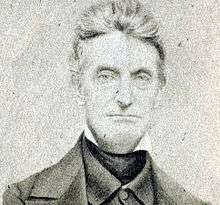Richard D. Webb

Richard Davis Webb (1805-1872) was an Irish publisher and abolitionist.
Life
Webb was born in 1805. In 1837, he was one of three founding members, with James Haughton and Richard Allen, of the Hibernian Antislavery Association. This was not the first antislavery association but it was acknowledged to be the most active and considered the most ardent abolitionists in Europe.[1][2] Allen served as the secretary of this association.
Webb married Hannah Waring and they had four children Alfred, Richard, Deborah and Anne. Webb and his two sons Alfred and Richard were regular correspondents with the American abolitionist.William Lloyd Garrison.[3]

Webb was one of the few Irish delegates at the 1840 Anti-Slavery Society in London which attracted hundreds from the United States. The Irish delegation included Webb, Richard Allen, and Daniel O'Connell. In 1846, Webb attended another world convention in London. This time the subject was temperance and Webb's fellow delegate Richard Allen was one of the speakers.[4] Webb met the American delegates Wendell Phillips and his wife Ann and Ann reported how they were particularly impressed by Webb.[5]
When Frederick Douglass visited Ireland it was Webb who was responsible for setting up his speaking engagements and also organising the printing of Douglass' book, The Narrative of the Life of Frederick Douglass. Douglass was earning up to £750 from a single print run and he was asking Webb for more copies.[6]
Webb was notable in Douglass's regard for the arguments that he and Webb had. Douglass felt that white abolitionists would prefer to be hypocritical than be racist and would try not to disagree with him face to face. Webb however showed no such false regard and they argued as equals in a way the Douglass hoped would be a precursor of the relationships that might exist across the races when slavery ended in America.[6]
Webb wrote The Life and Letters of Captain John Brown'[7]
He died in 1872.[8] The image shown is of John Brown not Richard Davis Webb
References
- ↑ http://muse.jhu.edu/journals/new_hibernia_review/v005/5.1ferreira.html Frederick Douglass in Ireland: the Dublin Edition of His Narrative, New Hibernia Review 5.1 (2001) 53-67, The University of St. Thomas, 2001
- ↑ Hinks, Peter P.; John R. McKivigan; R. Owen Williams (2007). Encyclopedia of antislavery and abolition p373. p. 796. Check date values in:
|access-date=(help); - ↑ The Letters of William Lloyd Garrison, Volume 6, Page 56, retrieved 24 July 2014
- ↑ The proceedings of the World's Temperance Convention p48-49. Richard Barrett Jun. 1846. Retrieved January 2010. Check date values in:
|access-date=(help) - ↑ Ann Phillips, wife of Wendell Phillips, a memorial sketch, 1886, retrieved 24 July 2014
- 1 2 Frederick Douglass in Ireland: the Dublin Edition of His Narrative, Patricia J. Ferreira, 2001, accessed May 2009
- ↑ The Life and Letters of Captain John Brown, Richard Davis Webb, 1861
- ↑ Harrison., Richard S. (1993). Richard Davis Webb Dublin Quaker printer, 1805-72. Dublin. p. 84.